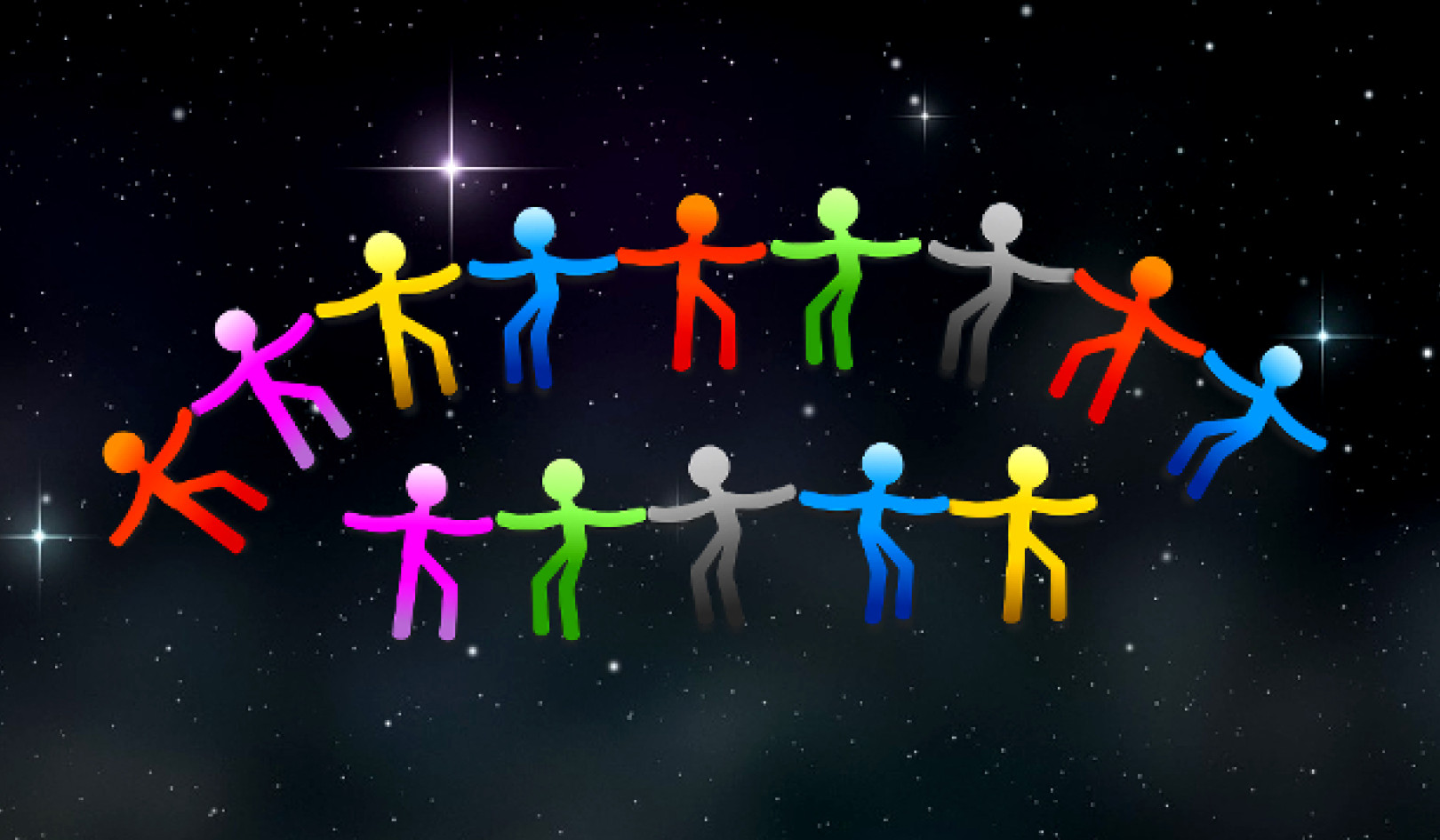
Image by Ralf Kunze
When we start to do something meaningful and important, such as meditation, excuses come up that prevent us from giving it our whole heart and attention.
We can fritter away days and nights on mindless diversions, but when it comes time to meditate, suddenly all sorts of obligations, false expectations, or doubts arise. We might think, "I should be with my family," or "I need to concentrate on making money," or "I should be doing some social work." Or else we doubt the meditation: "I'm not equipped for this. Maybe there's a better method," and so forth. The self-deluding excuses are endless.
Obstacles like these, both in daily life and in meditation, can start as innocent imps but turn into destructive demons if we are not careful. A few years after arriving in India as a refugee, I began to learn English. Whenever I picked up my English reader, my concentration was always broken by such thoughts as, "It's more important to pray and meditate than to study English. Before I can learn English, I might be dead. At death, nothing but positive habits of mind will benefit me." But then when I prayed, messages would come into my head, such as, "Life is long, refugee life is hard, and in order to survive, I must learn English."
I indulged in all kinds of feasts of laziness to avoid what was good for me. It took a lot of time and effort to overcome my resistance and to feel comfortable learning English when I was supposed to study it and saying prayers when I was supposed to pray.
Overcoming such habitual tendencies, reprogramming my mental habits, came as the result of long and consistent discipline through two methods: (I) vigilant mindfulness and (2) applying the whip of right messages.
Mindfulness: Giving of Oneself to the Moment
Mindfulness is the term Buddhists use to describe the giving of oneself to the moment. Instead of worrying about the past or planning for the future, we learn to feel at home in the present. It is the most wonderful guardian of our well-being if we live this way. So, no matter whether we are cutting the lawn or meditating, we should give ourselves completely to that. Our minds are really most at home living fully like this, but it can take practice before we learn to be in the present moment without chasing after cravings or worries.
If we feel resistance to something, one approach is simply to be aware of the resistance, without judgment or guilt. Then we can ease into the activity slowly, with an openhearted feeling that we will simply give ourselves to doing that. It's surprising how much we can learn to enjoy what we're doing if we are patient and open and if we just live in the present.
It could also help to push ourselves a little, gently but firmly. We can recognize the tricks of the wild and wandering mind and give ourselves a positive message to get back on track. When I was growing up in the monastery, my wise and dignified tutors knew all the tricks of boys who could be lazy and unruly. Often teachers could be strict, but my teachers were always loving. Sometimes the training we give our minds is like the training loving parents give to small children, who must be guided to keep them from wandering off into possible harm.
We need to learn a balanced approach to our minds, sometimes pushing gently but firmly if the mind is too lazy or wandering but never being too forceful or aggressive. When we are meditating, it can be easy to give up at the slightest unpleasant feeling or resistance. Again, we should simply be aware of those feelings and then ease back into the meditation.
Feeling Good About Meditation
Many beginning meditators have complained to me, "It isn't fair for me to meditate in a pleasant place and experience peace while so many others are struggling."
Although this is a beautiful thought, it is also outrageous. If we are honestly worried about being selfish, we are to be commended for such a wonderful attitude. If we respect and care about others more than ourselves, that is the heart of Buddhist practice. That attitude will naturally give us more strength and openness, and those who have it deserve to be saluted. But most of these guilty feelings ("I should be helping others, not meditating") are excuses to avoid making a commitment to anything worthy. Those who dwell on the need to be "selfless" as a substitute for nurturing peace of mind may be using this as an excuse to remain idle.
Such guilt feelings could be a sign of shock, a reaction to having our inner wounds poked by our new experience of meditation. The experience might be so intense and foreign that some of us feel safer shying away from it than bearing it.
We must understand that in order to help others, we need to improve our own minds and allow ourselves the chance to experience peace. If we don't have bread, how can we share a piece of bread with another hungry person? If our minds are filled with worries, hatred, and pain, how can we help others find peace and joy?
As the Christian contemplative Thomas à Kempis said, "Keep yourself at peace first, and then you will be able to bring peace to others."
Making It Simple
Sometimes a very simple approach to meditation is needed, either because of time constraints or because utter simplicity suits your temperament and background.
One of the simplest meditations of all is to follow your breathing. Bringing your awareness to your breathing is an elemental act of contemplation. It focuses and calms you, and while it is absolutely appropriate for beginners, it can also lead to higher realization. During the activities of the day, you can reconnect with your breathing at any moment, touching calmness and peace on the inhalation and exhalation. When you are distressed, focusing on the exhalation can help calm you down.
Another simple approach is to meditate on first waking in the morning, while still in bed. When people are looking for something "easy" but effective, this is the practice I most often recommend. Your awareness is so open upon first awakening, it is a fertile moment to encourage your peaceful mind. Instead of chasing after scattered thoughts and worries, simply rest in the open feeling of waking up. Be aware of the warmth of your body or your breathing or the light coming in the window. Rest openly in whatever feeling you are having. You could also think of your body as being a body of light, like the light of a new day.
When you rise, get up mindfully, with a heart open to the new day. Then pause during your daily routine and bring back whatever peaceful or spacious feeling you may have experienced in the morning. Allow yourself a few moments to rest in the openness.
You need to know enough about your mind to choose which meditation is best suited to your needs. Your needs, as a meditator and participant in life, can change according to the moment and the demands of mood and circumstance. The wise counsel of others can help you. But ultimately you are responsible for your own well-being and must look to your inner wisdom to help guide you.
Avoiding Expectations
For healing, it is important to have inspiration. A hopeful and inspired feeling generates enthusiasm, trust, and openness and makes it easier for us to meditate.
However, we should not obsess about the meditation experience or have rigid expectations about what should happen. Grasping after results will only become a tourniquet that constricts our mental and physical energies.
We shouldn't impose mental limits of time, quality, or scope, such as the thought, "I should be healed within such and such a time," or "I must do an effective job of healing my problem." Such a mind-set can limit our progress.
In a natural way, we must take every breath and every day of our lives, no matter what it brings, as part of the process of healing, just as people go to work every day, rain or shine.
Staying With It
Some people who come to my workshops think that all their problems will be cured, like magic, in one session. Unfortunately, it hardly works that way. These days, we're conditioned to want a "quick fix" and instant results. If we meditate with wholehearted openness, it can make a difference even in a weekend. But we have to keep going.
Not long ago, a great Buddhist spiritual teacher gave a talk to a Western audience, advising them to meditate a little bit every day. "It may not make a difference in the short run," he said, "but in weeks, months, years, or maybe decades, then you will feel something different." People started laughing; they had wanted to hear him say that all the benefits would be achieved immediately. But it can take time, and that discourages a lot of us. If we resolve to practice this week for ten hours and we're not totally changed people as a result, we're ready to give up. We think it's not working.
For years, much of our energy has gone into worrying about problems and about what we want. This is like negative meditation. So we've been training ourselves in the wrong direction. Reversing this takes more than a few hours or days.
We need to be patient and consistent. We eat food every day. We don't question doing that. But when it comes to meditation, we somehow think, "I did it once; I don't want to do it again."
The key is to make meditation a part of our lives, like weaving a thread into the fabric of a tapestry. Bringing an attitude of enjoyment to our meditation helps tremendously. It also helps for us to bring the peaceful feelings of meditation into our daily activities. That is how we can begin tasting the fruits of our efforts.
When the healing of mind becomes a habit, our minds become like a great river. Although the river may not always appear to be moving, if we look closely enough, we will see how the water is slowly, slowly making its way to the sea.
Rejoicing in Progress
It is always important to see and recognize the progress that you have made as the result of your meditation, even if it is small. Notice any positive change in how you think, feel, or act. Give yourself the opportunity to enjoy the experience of feeling good, as much and as long as you can. Celebrate and rejoice in any progress whatsoever. When you stumble, be glad of that, too, since struggle can be a fruitful part of growth if you think of it that way.
Even if you have made good progress, you will diminish it by thinking, "Oh, my meditative progress is so insignificant," or "What can a little meditative experience do in relation to the mountains of problems I'm facing?" Then the positive energy that you have generated by the meditation will dissipate, and your negative energies will have a chance to regain their foothold.
If you meditate for five minutes, don't say, "It's too bad I couldn't have meditated for half an hour." Instead, tell yourself, "I did five minutes. Wonderful!" Sometimes we are lazy, crazy, or wild; then we may need to push ourselves back on the path. But beware of always putting a negative spin on what you do. Instead, notice the positive, expand on the feeling, and keep the healing energy flowing.
When you rejoice over the meditation that you have done, then even if your meditation and its results are insignificant, the healing power generated by them will become magnified. The healing of your afflicted mind can continue day and night because of the power of rejoicing. It is like investing a little capital in an extremely hot stock in a booming market.
Reprinted with permission of the publisher,
Shambhala. ©2000. www.shambhala.com
Article Source
Boundless Healing: Meditation Exercises to Enlighten the Mind and Heal the Body
by Tulku Thondup.
 This book offers simple meditation techniques to awaken healing energies in the body and mind. Using Buddhist principles as a basis, Tulku Thondup has created a universal guide that anyone can use. It will benefit those who want to preserve good health as well as those who need comfort and relief from illness or mental distress.
This book offers simple meditation techniques to awaken healing energies in the body and mind. Using Buddhist principles as a basis, Tulku Thondup has created a universal guide that anyone can use. It will benefit those who want to preserve good health as well as those who need comfort and relief from illness or mental distress.
Info/Order this book
About the Author
 Tulku Thondup was born in Tibet and studied at the Dodrupchen Mastery. He fled to India in 1958, where he taught for many years. In 1980 he moved to the United States as a visiting scholar at Harvard University. His many books on Tibetan Buddhism include The healing Power of Mind, Masters of Meditation Miracles, Enlightened Journey, and The Practice of Dzogchen.
Tulku Thondup was born in Tibet and studied at the Dodrupchen Mastery. He fled to India in 1958, where he taught for many years. In 1980 he moved to the United States as a visiting scholar at Harvard University. His many books on Tibetan Buddhism include The healing Power of Mind, Masters of Meditation Miracles, Enlightened Journey, and The Practice of Dzogchen.


























